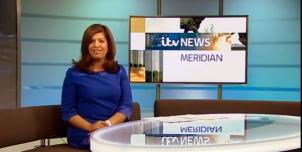Full Freeview on the Dover (Kent, England) transmitter
| Google Streetview | Google map | Bing map | Google Earth | 51.112,1.247 or 51°6'41"N 1°14'51"E | CT15 7AQ |
The symbol shows the location of the Dover (Kent, England) transmitter which serves 190,000 homes. The bright green areas shown where the signal from this transmitter is strong, dark green areas are poorer signals. Those parts shown in yellow may have interference on the same frequency from other masts.
This transmitter has no current reported problems
The BBC and Digital UK report there are no faults or engineering work on the Dover (Kent, England) transmitter._______
Digital television services are broadcast on a multiplexes (or Mux) where many stations occupy a single broadcast frequency, as shown below.
64QAM 8K 3/4 27.1Mb/s DVB-T MPEG2
H/V: aerial position (horizontal or vertical)
The Dover (Kent, England) mast is a public service broadcasting (PSB) transmitter, it does not provide these commercial (COM) channels: .
If you want to watch these channels, your aerial must point to one of the 80 Full service Freeview transmitters. For more information see the will there ever be more services on the Freeview Light transmitters? page.
Which Freeview channels does the Dover transmitter broadcast?
If you have any kind of Freeview fault, follow this Freeview reset procedure first.Digital television services are broadcast on a multiplexes (or Mux) where many stations occupy a single broadcast frequency, as shown below.
64QAM 8K 3/4 27.1Mb/s DVB-T MPEG2
H/V: aerial position (horizontal or vertical)
The Dover (Kent, England) mast is a public service broadcasting (PSB) transmitter, it does not provide these commercial (COM) channels: .
If you want to watch these channels, your aerial must point to one of the 80 Full service Freeview transmitters. For more information see the will there ever be more services on the Freeview Light transmitters? page.
Which BBC and ITV regional news can I watch from the Dover transmitter?

BBC South East Today 0.8m homes 3.2%
from Tunbridge Wells TN1 1QQ, 69km west (270°)
to BBC South East region - 45 masts.

ITV Meridian News 0.7m homes 2.7%
from Maidstone ME14 5NZ, 52km west-northwest (289°)
to ITV Meridian (East) region - 36 masts.
All of lunch, weekend and 50% evening news is shared with all of Meridian plus Oxford
How will the Dover (Kent, England) transmission frequencies change over time?
| 1960-80s | 1984-97 | 1997-98 | 1998-2012 | 2012-13 | 16 Oct 2019 | ||||
| VHF | C/D E | C/D E | C/D E | C/D E T | W T | ||||
| C10 | ITVwaves | ||||||||
| C33 | BBCA | ||||||||
| C35 | D3+4 | ||||||||
| C36 | BBCB | ||||||||
| C39 | SDN | ||||||||
| C42 | ArqA | ||||||||
| C48 | ArqB | ArqB | |||||||
| C50tv_off | BBC1waves | BBC1waves | BBC1waves | BBCA | |||||
| C51tv_off | D3+4 | ||||||||
| C53tv_off | C4waves | C4waves | C4waves | BBCB | |||||
| C55tv_off | SDN | ||||||||
| C56tv_off | BBC2waves | BBC2waves | BBC2waves | ||||||
| C57tv_off | _local | _local | |||||||
| C59tv_off | ArqA | ||||||||
| C66 | ITVwaves | ITVwaves | ITVwaves |
tv_off Being removed from Freeview (for 5G use) after November 2020 / June 2022 - more
Table shows multiplexes names see this article;
green background for transmission frequencies
Notes: + and - denote 166kHz offset; aerial group are shown as A B C/D E K W T
waves denotes analogue; digital switchover was 13 Jun 12 and 27 Jun 12.
How do the old analogue and currrent digital signal levels compare?
| Analogue 1-4 | 100kW | |
| BBCA, D3+4, BBCB | (-1dB) 80kW | |
| SDN, ARQA, ARQB | (-4dB) 40kW | |
| Mux 2*, Mux A*, Mux B* | (-17dB) 2kW | |
| Mux 1*, Mux C* | (-20dB) 1000W | |
| Mux D* | (-23dB) 500W |
Local transmitter maps
Dover Freeview Dover DAB Dover TV region BBC South East Meridian (East micro region)Which companies have run the Channel 3 services in the Dover transmitter area
|
|
Sunday, 15 July 2012
D
David4:28 PM
Kevin James
im geting the channels that are runing at 40,000 watts each & 48 UHF ok here.
it mite be down to your setup.
as your asked the multiplexes that run at this power dont have to be the same as the PSB one's as they go out at 80,000 watts each & must cover about 98% as for the com
multiplexes they must cover jest about 90%
but i dont not if iam right. the other david will tell me if im right or not.
| link to this comment |
K
KMJ,Derby5:33 PM
Kevin James: It is worth noting that the original analogue transmitters at Dover used to be at 100kW. The power necessary to give the same coverage with the current Freeview transmitters would usually be 20kW, so the COM muxes have double this and the PSB muxes four times the normal power in order to reinforce the signal in the face of possible interference from the continent on those occasions that the inversion effect is experienced. If C48 is the the only frequency giving problems it is possible that slight repositioning of the aerial could effect an improvement to the signal being received on that mux.
| link to this comment |
Wednesday, 18 July 2012
N
Nick7:39 PM
Woodbridge
All fine north of Felixtowe, well out of range.
| link to this comment |
Nick's: mapN's Freeview map terrainN's terrain plot wavesN's frequency data N's Freeview Detailed Coverage
Friday, 27 July 2012
J
John McConnell12:58 PM
Can anyone explain why during the last week there have been many issues affecting reception of BBC1/2 (and occasionally other channels). Complete loss of signal!
On both TV(internal) and Digibox(external) setups.
I am in the Margate area (using Freesat thankfully) but many of the elderly tenants in this community are now using the governement provided digibox on their TV.
| link to this comment |
John McConnell: The terrestrial Freeview service could be being affected by co-channel interference. See the inversion effect. This does not affect satellite services.
| link to this comment |
D
David2:28 PM
Sandwich
i lost the signal on SDN yesterday but i put this down to the hot wether we have been get in kent. only thing is this did not hit the other com muxes or BBC A or D3&3 muxes.
| link to this comment |
David's: mapD's Freeview map terrainD's terrain plot wavesD's frequency data D's Freeview Detailed Coverage
Monday, 30 July 2012
J
Jim2:36 PM
Herne Bay
Here in Herne Bay we lost mux BBCa on Ch50 for a while at the end of last week. I'm sure it was the strange weather conditions - we had a small FM RSL radio station in the area last week, Red Sands Radio, and they commented on reception reports from far and wide during the same period. Normally CH50 is the strongest here. Before switch over a strong analogue signal bouncing in from elsewhere would often swamp our digital mux on the same channel - I was a bit surprised to loose a powerful mux AFTER switch over!
Strangely, on one TV only, I have had problems with the mux on CH59 since switch over. After the problems last week that mux is now coming in fine! Are the engineers still tinkering - or will it go again? Time will tell.
| link to this comment |
Jim's: mapJ's Freeview map terrainJ's terrain plot wavesJ's frequency data J's Freeview Detailed Coverage
K
KMJ,Derby5:42 PM
Jim: I have just had a look at the William Hepburn's tropospheric ducting forecast for last Friday and there was (for about 6am)a fair chance of ducting in the SE of England, stretching into East Anglia and the North of France. Although the digital signal on C50 is four times that which would normally be used to match the former analogue coverage, the analogue service did not have to contend with C50 being in use at Tacolneston, the nearest English high power transmitter at that time would have been Sutton Coldfield.
| link to this comment |
I
Ian Fletcher7:43 PM
Dover
I live at West Hougham, CT15 7AZ, (under the mast) and am getting the warning, after I have viewed channel 50 for half an hour or so, and the screen going all red with shadow figures moving around, that this channel is not available in my area and I should tune to channel 101/1. But i have just watched it. What is going on?
| link to this comment |
Ian's: mapI's Freeview map terrainI's terrain plot wavesI's frequency data I's Freeview Detailed Coverage
J
jb388:22 PM
Ian Fletcher: What model of TV or box are you seeing this indication on, and if you take the aerial out and use a short piece of wire (about 12") in the socket do you still see this indication, or do you maybe even receive a picture without the aerial?
This odd indication of an obviously false nature "might" be due to signal data corruption in your tuner due to it receiving an excessively high level of signal because of your relatively close proximity to the transmitter.
| link to this comment |
Select more comments
Your comment please!




